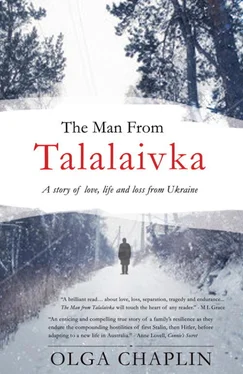“They’re closing in again… those buildings have become markers for their bombs,” he realised, as the bombers’ distant hum grew closer and became a menacing growl; about to release their lethal tonnage from higher, more confident altitudes, to the despair of Hitler and his OKH.
The truck rumbled forward a few more metres. Peter looked up as the night sky flashed white as anti-aircraft fire shot out from the direction of Berlin. He could now see the hard-wire fence, high above the truck as it passed through the gates, and could just make out the rows of barbed wire higher still, like an illusory glitter of stars reaching up into the night. He pressed his family closer to him. They were saved from incarceration on the train but were now facing another imprisonment, with no prospect of escape, nor of survival, still within range of Berlin’s bombs. He felt the panic, prayed silently as he felt Evdokia and the children clinging to him. There was no knowing how much time they would have together, as a family; no knowing how long any of them would live, from this night on.
* * *
Evdokia pulled at her old jacket for warmth, felt the end of the rough blanket, then realised, in those waking moments, that she had wrapped it over the children as they sank to the concrete floor in the dark. Her body ached with exhaustion and hunger. She peered into the near-dawn dark, trying to make sense of their surroundings. Hundreds of other inmates lay all around her, so lifeless in their exhausted sleep that it seemed, in her semi-conscious moments, as if she had been unwittingly placed in some kind of morgue. She peered further, her eyes searching for Peter, felt the panicked shock as she remembered those last moments of separation, of the men being taken from their families and that last desperate supportive clasp of Peter’s hand on hers as he was forced to join the other men. She caught her breath, suppressing a sob, hid her grief under cover of her jacket. She had to be strong, for the children. She had to remind herself that the German army, authorities, must have some purpose for them, would surely aim to keep them alive, having taken them so far from her Ukraine. She closed her eyes, sleep overtaking her turmoil-filled state.
A shrill siren signalled the formal start of their day.
“Achtung! Achtung! Aufstehen! Aufstehen!” An older, burly soldier waved his juniors along the huge workshop. Like automatons, each repeated the senior’s orders, their rifles, though pointed to the floor, still menacing. Evdokia grabbed the blanket, took Mykola and Nadia’s little hands and queued in line with other frightened women clinging to their children, waiting to be checked by the grim-faced officials at the entrance of the building. Evdokia, in turn, stepped forward, looking away from the steely-eyed official who coldly inspected her suitability for work, waited for his nod before joining another queue.
As the grey dawn emerged, she could now see the full dimensions of this massive structure, with its solid high walls and steel girders that hung parallel along the building, a metre below the ceiling, with great wheels, chains and hooks attached and the conveyor belt and benchtop running almost the full length of the building. She had never seen an engineering factory, had no experience of what it may have produced.
“They must want us to work here,” she thought, puzzled. “But we have no skills in such things. What could we possibly do, all this way from our homes? It’s inconceivable.” She shuddered, as she noticed for the first time that each glass panel of the large windows of this gloomy factory had been meticulously painted black, with no prospect of seeing the sky, or a cloud, or even a green-tipped fir tree. She sighed, controlling her fears for her children’s sake; resigned to a fate unknown, she waited in the queue as, one by one, each woman and child was recorded, and each jacket ink-stamped at the left shoulder.
She tried to comfort Nadia and Mykola in their bewilderment and fear. “Everything will be alright,” she lied to her children to calm them. She could not yet understand the significance of the ‘OST’ initials, Hitler and Goering’s ingenious labelling of the ‘Ost-Arbeiters’, their forced labourers from the Ukraine: could not gauge whether it gave them protection from a concentration camp, or was a temporary passport to it.
A chilly wind whipped around them as they trudged, silently, to their dormitory. Evdokia clasped her children’s hands, felt their warmth as they walked the short distance in the forest. The fir trees and heavy foliage blocked out the daylight, yet ironically protected them from the distant drones of bombers somewhere in the distance. She drew on her inner strength, as she carried little Nadia the rest of the way and smiled at Mykola: the children pale-faced, too afraid to say they were hungry, trusting her reassurance.
Another older, limping soldier waved the queue into the dormitory with his rifle while other soldiers allocated a bunk for each woman, in strict order, and marked them off. Evdokia slumped on the lowest bunk, spread the blanket around her shivering children. She prayed the narrow bunk would be their refuge, for how long she knew not.

Chapter 28
The hellish nightmare began with each dark dawn. Like a regimented prison cue, the dormitory siren shrilled its command. Her deep sleep snapped, Evdokia jumped up, reached for the wet rag she prepared each night before sleep overtook her, wiped her children’s faces, kissed them quickly. She managed a brief smile, to try to reassure them that each day was routine, and safe.
“Be good children, Nadia and Kola; be good today for Tato and me,” she whispered, her own anxiety gnawing at her as she watched them run dutifully to the waiting soldier, to be led to their daytime dormitory. She wiped her face with the wet rag, ran her fingers through her long hair, deftly looped it into a bun and straightened her now-loose skirt and jacket. Her inner sense told her she must present well, whatever happened. She had her children and Peter to think of.
Already, all around her in these two months since their imprisonment, women were becoming dishevelled and emotional, some, breaking down entirely, unable to move from their beds or, worse, becoming suddenly hysterical as they worked at their conveyor belt. They were removed without warning, not heard of again, their children left to be cared for by other women in the dormitory. She winced as she thought of these poor distraught women, who could no longer cope with the anxieties of their incarceration and fear of bombs. She felt heartbroken for these children who would almost certainly remain orphans.
Each day, she presented herself ready to glimpse Peter as he and the other male prisoners were lined up outside their dormitory to climb onto the trucks that sent them to the southern outskirts of Berlin to clear the rubble of the bombed buildings: she and her inmates marched to their converted ammunition factory each dawn, as Peter and his inmates were trucked to the destroyed buildings, all returning at dusk, or night. Her only hope was catching a glimpse of him as he stood in the truck, facing her dormitory, straining to see her in the queue as the women were marched to the factory.
She sat at her workbench, in winter’s semi-dark, carefully spread the tiny square of concocted butter onto the piece of black bread with her fingers and ate it quickly, gulped the black chicory coffee a shaky-armed soldier had poured at the queue-line, and then placed her tin mug for safety at her feet. It would be many hours’ wait to the lunch break, at the workbench: the watery vegetable-like soup always insufficient to quell the constant hunger pangs. The evening kasha, though little better, signalled that rest would come: her reward, to share the kasha with her children and to hold them, knowing they were still safe.
Читать дальше













